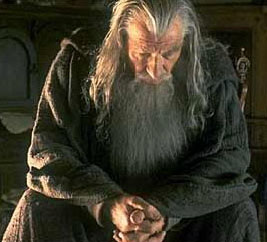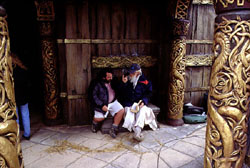|



 |
"Mercy!" cried Gandalf: "if
the giving of information is to be the cure of your
inquisitiveness, I shall spend all the rest of my days in
answering you. What do you want to know?" |

15 January 2002

From: Kris Cooper cooper_kris@hotmail.com
Q: I am an artist who has centered my work on the writings of J.R.R.
Tolkien. My favorite character has always been Gandalf. I admire your
skill as an actor, and I'm amazed by how well you fit the role of
Gandalf. How do you feel about the fact that the coming wave of Tolkien
art, specifically art containing pictures of Gandalf, will bear your
face?
A: Nothing but pride - although it won't really be my face,
rather the face that I assumed when playing Gandalf the Grey. Gandalf
the White looks a bit different - less than a year to go to find out how
different! Meanwhile all luck with your own work.

From: Langford Jordan
Q: My question: All actors (at least the good ones) bring something
of themselves to a character and this usually enhances a performance.
What feature of your own character do you feel you bring to that of
Gandalf? Ps. You were excellent in Jack
and Sarah!
A: My answer: Having seen Gandalf on screen I am feeling
rapidly removed from him as if he now exists (as of course in the novel
he always had) independently of me. Now I have observed him, I realise
we both like smoking, the countryside, a good laugh, a mission and a
taste for stylish headgear.
PS William in that jolly
film was a middle-class misfit of great perceptions - a Gandalf the
Grey part-prototype as it turns out.

From: Donald
Q: I just wondered what you thought the main reasons for the success
of LOTR were? The book is nearly 50 and still going strong - and at
1100+ pages is not the usual sort of thing that makes a blockbuster. So,
in a nutshell, what do you think the attraction is?
A: Is it that it looks like a challenge that is really an
adventure story set long long ago, a once-upon-a-time-yet-for-real
story. So those who like that sort of thing start to read it and then
are pulled in by the discovery that Lord of the Rings is about
the times. For us it is about the morality of war, of goodness, of
fraternity. Like all classics, it is adopted by each generation. In the
'40s and '50s the hobbits would seem like the privates battling Hitler;
the '60s took to the fantasy and ideals and sense of fellowship. Perhaps
thereafter there was a whiff of "required reading" yet the
sales continued steady. Though I bet there is many a bookshelf with an
unread LOTR next to Gormengast and The Tales of Narnia.

Peter Jackson, Ian McKellen, and Tolkien
Photo by Pierre Vinet

From: Lee Cash
Q: My question refers to the Balrog. It was a truly amazing scene in
the first film and I hunger for more exposure to Durin's Bane. Can you
confirm that we will see more of Gandalf's battle with the Balrog:
perhaps as a flashback when Gandalf tells the tale of his battle against
such a powerful foe?
A: Your question would be better addressed to Peter Jackson who
is currently editing and preparing The Two Towers in Wellington,
New Zealand. But we have filmed sequences which could be part of a
flashback to Gandalf's fate after his fall from the bridge in the Moria
Mines.

From: Don Gorman shelf@cadvision.com
Q: Having been an avid and passionate reader of William Shakespeare
for most of my adult life, I find that everything worthwhile is -
somehow - influenced by Shakespeare's writings. Now, having just seen
the film version of Tolkien, I must admit that throughout the experience
echoes of Shakespeare seemed to be everywhere; yet, I cannot place a
finger on a specific link between a play and Tolkien's Trilogy. Do you
feel that Tolkien was heavily influenced by Shakespeare's language
and/or philosophy in a specific way?
A: It is not easy to compare a dramatist and a novelist but
Tolkien is more influenced by epic writers (of e.g. Beowulf and The
Bible) than by Shakespeare. It can be misleading to extrapolate
Shakespeare's own philosophy from that of his multifarious characters and
his dense poetical expression is far-removed from Tolkien's prose.

From: Michael Cain mcain@presinter.com.au
Q: As a young, gay, first-time reader back in the 80's, I was tickled
by the scene where Gandalf pulls Sam in through the window at Bag End
and Sam pleads "please don't turn me into anything - unnatural
!". Not meaning to speak for the entire sisterhood, but my partner
and I love to find gay inuendo/humour between the lines of movies. Was
that a twinkle I saw in your eyes, glancing over at Frodo, as you played
out this scene with Sam? Love to know if you've chuckled at this line
too?
A: Meaning is in the ear of the listener and until you pointed
it out I took Sam's plea to refer to things monstrous rather than to
sexuality. More generally I am glad Frodo's affection for Sam is so
tactile and central to their relationship in the film.



More 
Additional E-Posts about LOTR may be found in

The Lord of the Rings
|



